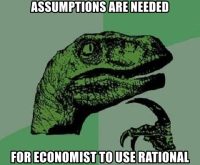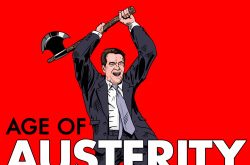The rational expectations putsch The tiny little problem that there is no hard empirical evidence that verifies rational expectations models doesn’t usually bother its protagonists too much. Rational expectations überpriest Thomas Sargent has defended the epistemological status of the rational expectations hypothesis arguing that since it “focuses on outcomes and does not pretend to have behavioral content,” it has proved to be “a powerful tool for making...
Read More »Into Eternity
[embedded content]
Read More »Rybin Male Choir
[embedded content]
Read More »Public debt — questions and answers
Public debt — questions and answers Can a government go bankrupt? No. You cannot be indebted to yourself. Can a central bank go bankrupt? No. A central bank can in principle always ‘print’ more money. Do taxpayers have to repay government debts? No, at least not as long the debt is incurred in a country’s own currency. Do increased public debts burden future generations? No, not necessarily. It depends on what the debt is used for. Does maintaining full...
Read More »John Hassler och Klas Eklund — etablissemangsekonomer med dimljuset på
John Hassler och Klas Eklund — etablissemangsekonomer med dimljuset på Det är svårt att hitta en mer missbrukad ekonomisk klyscha än just ”strukturreformer”. För att citera en diskussion i Financial Times; ”Strukturreformer är en tom amatörekonomisk fras, ofta med vaga referenser till avregleringar och skatte- och budgetnedskärningar”. Ordet dyker ständigt upp när något lands ekonomi anses ha kört fast på en för låg tillväxtkurva … Så också när man i början...
Read More »The real public debt problem
The real public debt problem The claim that our public debt is excessive has been used as a major justification for austerity – cuts in spending. That massive debt, we are told, 1) must be repaid, 2) threatens our country with bankruptcy, and 3) is a burden on future generations. All these are wrong. Let me explain why … Britain’s national currency is managed by our central bank, the Bank of England, owned by the citizens of the United Kingdom (that is, our...
Read More »Speaking truth to power
Speaking truth to power [embedded content] A “millionaire funded by billionaires” is not “part of the solution” but rather “part of the problem, actually”. No beating around the bush there. Great! ZEIT: Hat Carlson nach dem Interview noch einmal den Kontakt zu Ihnen gesucht? Bregman: Ja. Wollen Sie seine Antwort sehen? (er zieht sein Telefon hervor und liest aus seiner E-mail vor) “Mir hat gefallen, was Sie in Davos gesagt haben, und ich hatte grosse...
Read More »Alan Krueger (1960 – 2019)
Alan Krueger (1960 – 2019) I’ve subsequently stayed away from the minimum wage literature for a number of reasons. First, it cost me a lot of friends. People that I had known for many years, for instance, some of the ones I met at my first job at the University of Chicago, became very angry or disappointed. They thought that in publishing our work we were being traitors to the cause of economics as a whole. David Card Back in 1992, New Jersey raised the...
Read More »Public debt — a macroeconomic necessity
Public debt — a macroeconomic necessity The problem stems from the fact that the affluent, which include successful entrepreneurs and capital owners, save relatively more than average or poor households … For this to work out, additional demand would have to be created … The implication of this is that there’s a macroeconomic requirement to run public deficits, founded on a demand gap that arises from households and firms wanting to set aside savings in...
Read More »MMT — the Wicksell-Le Bourva connection
MMT — the Wicksell-Le Bourva connection Comparing the limited work of Wicksell, Le Bourva, and MMT, we find that they share many similarities. Obviously, the institutions and issues being discussed have changed during the decades these scholars were writing, yet all three views agree on some fundamental issues. The methodology is quite similar, with a strong focus on balance sheets opposed to theoretical models based on assumptions that are necessary for...
Read More » Lars P. Syll
Lars P. Syll







